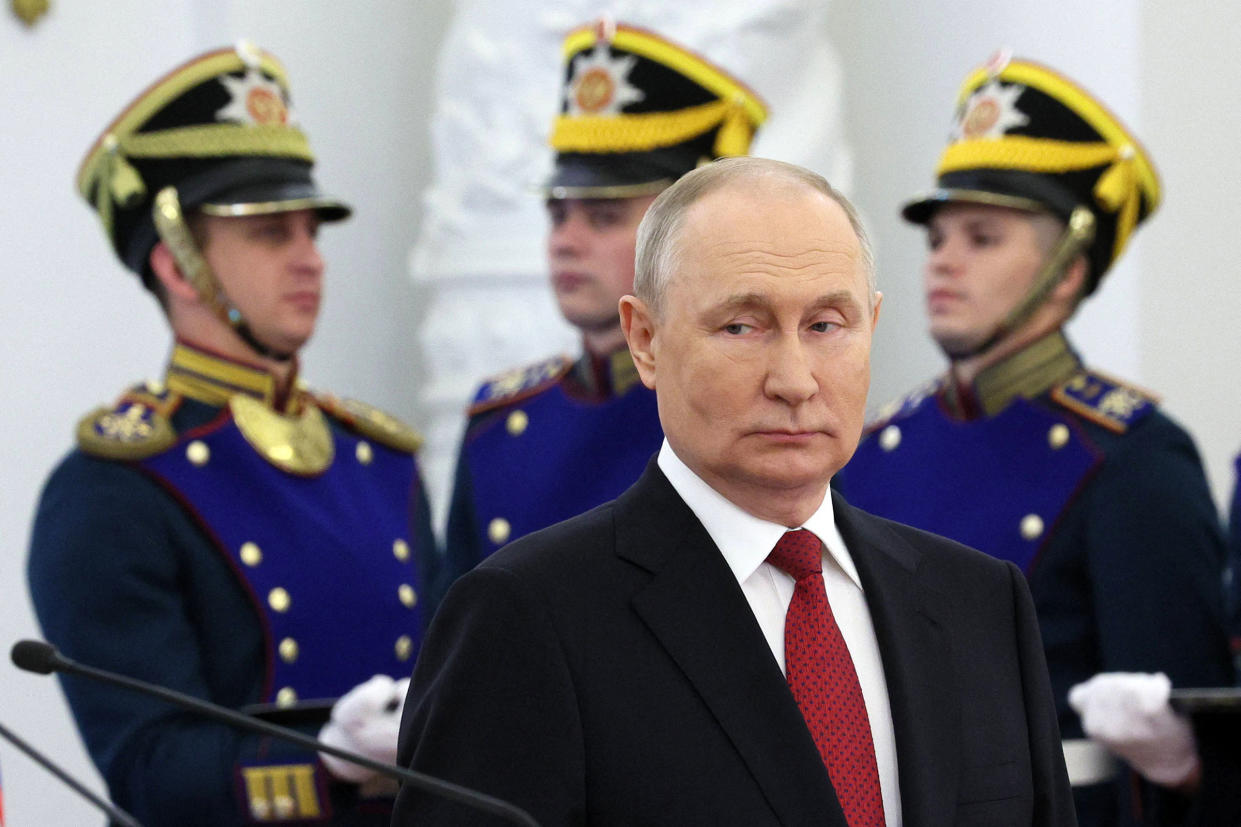Vladimir Putin Survived the Wagner Group Rebellion. History Shows That Doesn’t Mean He’s Safe

- Oops!Something went wrong.Please try again later.
- Oops!Something went wrong.Please try again later.
- Oops!Something went wrong.Please try again later.
Russian President Vladimir Putin attends a ceremony to present the Russian Hero of Labour gold medals and national awards as the part of celebration the Russia Day in Moscow on June 12, 2023. Credit - Gavriil Grigorov—Sputnik/AFP/Getty Images
This article is part of The D.C. Brief, TIME’s politics newsletter. Sign up here to get stories like this sent to your inbox.
Surviving a rebellion is not the same as winning one, be it in Moscow, Washington, London, or even Londonderry, N.H.
It’s a tough lesson from history that is worth considering days after Russian President Vladimir Putin seems to have weathered the most serious test of his leadership to date, repelling a mutiny that, at least for a few hours over the weekend, seemed as perilous as any stretch of Putin’s two-plus decades ruling Russia. By Monday, the Wagner Group’s revolt seemed to have petered out, sending its architect into exile and giving diplomats and spies in the West a chance to catch up and remind themselves just how much they still don’t know about Moscow and its vassal allies.
Put another way, and borrowing from former Defense Secretary Donald Rumsfeld: Western intelligence parties have a number of “known unknowns” about Putin, what comes after him, and the future of a vast former empire that stretches over 11 time zones. With nukes and oil both in play, not to mention strategic considerations about Russia’s geopolitical power vis a vis China and India, there was a whole lot of Monday-morning discussion of Washington’s blind spots when it comes to its rival after being given the first tangible evidence that the invasion of Ukraine may not be as popular as once argued inside the Kremlin.
But there’s also this corollary: a damaged leader can survive this style of challenge. The power of incumbency is one that has few rivals. Being commander in chief of Russia’s military complex—and the world’s largest reserve of nuclear weapons—comes with an advantage. And the open secret is that it may not be in the West’s interest to have Putin ousted.
A leadership vacuum in Russia could easily turn into a quagmire in the region, transitioning a stable and consistently vexing autocratic state into something approaching chaos. At the White House and State Department on Monday, spokesmen doubled-down on the standing assertion that the United States has no position in choosing Russia’s leaders.
There’s a good reason for this vague diplospeak, and such a devil’s bargain is familiar to Russia wonks. As TIME’s W.J. Hennigan writes, the threat of loose nukes is one that haunts Western policy hands to no end, “the stuff of nightmares.” At present there’s an accurate accounting of those nukes in an imperfect state, one that comes in between Venezuela and Republic of the Congo in rankings of civil and political freedoms. Autocracy, at least in this case, brings order. As Polish President Lech Walesa told George H.W. Bush during a 1991 period of uncertainty: “We are afraid of one thing in the Soviet Union—anarchy.”
This isn’t the first time Washington has faced deep uncertainty in Moscow that could upend the global order. Mikhail Gorbachev survived his 1991 coup attempt that found him locked in his dacha, cut off from the outside world with encircled troops, and pressured to resign for health reasons. Gorbachev prevailed after a few tense days in August—yet, by December of that year, was giving a farewell address and watching as the Soviet Union dissolved.
That’s the thing about the internal threats, be they military or political. The public can see weakness when seemingly invincible figures stumble. Once the aura is pierced, things can go south quickly. No matter the form of government, wounded leaders often soon find themselves with a newly minted honorific: Ex-.
A strong history rooted in democratic norms is no guarantee that a political rebellion can’t have similarly striking results. President Lyndon Johnson was the presumptive Democratic nominee for President in 1968 until anti-war Sen. Eugene McCarthy of Minnesota nearly won the New Hampshire primary and claimed 20 of its 24 delegates. A little less than three weeks later, LBJ was out of the race. It was similar when Ronald Reagan challenged incumbent President Gerald Ford in 1976 and Edward M. Kennedy sought to deny Jimmy Carter re-nomination in 1980. Both men won re-nomination and then lost the general election in November of those years. In the U.K., Prime Minister Margaret Thatcher faced her own Tory revolt in 1990, prevailed on the first round of voting, but a quick-moving Cabinet revolt forced the end of an 11-year run.
For now, Putin survived the challenge. Even in its weakened and distracted form, the Russian military was never likely to allow a band of mercenaries to overthrow a government—unless those professional troops believed in the cause. For now, they are not joining the rebels. But that doesn’t mean they won’t hear the echoes of 1917—or 1991—and suddenly remember how to march. After all, history is a tough mistress to defy.
Make sense of what matters in Washington. Sign up for the D.C. Brief newsletter.

